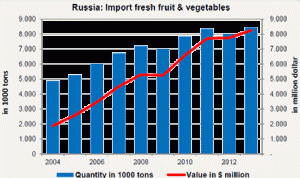Russian citrus imports rose by 6% last year compared to 2012. The markets for mandarin and grapefruit in particular show high growth rates, respectively 40% and 34%, reports the Russian website fruitnews.ru. Turkey and Morocco traditionally are the two main citrus suppliers, but have to surrender a part of their market share to South Africa and Egypt. A striking newcomer on the mandarin market is Georgia.
Russia imported 1.7 million tons in 2013, accounting for 1.68 billion dollars. An increase of 6% compared to the year before. The main suppliers of citrus are Turkey and Morocco, accounting for 40% of the total volume. Egypt is third, followed by South Africa and China. The first EU country on the list is Spain occupying the sixth place. Cyprus and Greece are good for respectively the eleventh and twelfth place.
Mandarins and oranges are the most popular citrus fruits amongst the Russian consumers. Last year Russia imported more than 838,000 tons, accounting for almost half of the total citrus import. The largest mandarin suppliers are Turkey and Morocco. Although the volume from Morocco decreased compared to the previous years, the volume from Turkey grew. Together both countries account for half the mandarin supply. Other major suppliers are China, Pakistan, Spain, Argentina and Abkhazia. In October 2013 Georgia was allowed to supply the Russian market and ended up twelfth on the list with 12,000 tons.
Oranges were mainly imported from Egypt and South Africa. Volumes grew to 70% of the import. In total Russia imported 500,000 tons of oranges. Other major suppliers of oranges were Turkey, Spain and Morocco.
Grapefruit import grew by 20% compared with 2012 to 147,000 tons. The largest supplier of this citrus fruit is China, followed by Turkey, South Africa and Israel. The rise in consumption is due to media attention.
In the first quarter of this year, import fell by 11% to 577,000 ton. Key suppliers are Morocco, turkey, Egypt, Pakistan, China and Spain. New comer Georgia exported 2.6 tons of mandarins to Russia.
Expressed as a percentage, the market share of the export countries is stable. Turkey is on top of the list with 24.6%, followed by Morocco (14.5%) and Egypt (14.1%). In recent years the import of mandarins increased by almost 40% from 605,000 tons in 2010 to 838,000 tons in 2013. The import of grapefruit is also on the rise, growing 34%. In 2010 109,000 tons was imported, in 2013 it rose to 147,000 tons
The orange import grew with 5% from 478,000 tons in 2011 to 504,000 tons in 2013. The volumes from Egypt and South Africa are growing at the expense of Morocco and Turkey.
